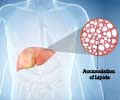A new study led by the University of Pittsburgh Graduate School of Public Health has suggested that long-term antiretroviral drugs for HIV decrease the risk for coronary atherosclerosis
A new study led by the University of Pittsburgh Graduate School of Public Health has suggested that long-term antiretroviral drugs for HIV decrease the risk for coronary atherosclerosis - a central risk factor for heart disease.
HAART, a course of treatment that involves the combination of three or more antiretrovirals, has been linked to an increase in cholesterol and other factors associated with atherosclerosis, leading some to question whether long-term use increases the risk of heart attack."When we first prescribed highly active antiretroviral therapy for HIV in 1995, we were concerned about how these drugs changed lipid levels in patients and whether they would increase atherosclerosis and ultimately lead to serious heart disease," said study's lead author Lawrence Kingsley, Ph.D.
"While some studies have found an association between these antiretroviral treatments and increased risk of cardiovascular disease, we believe our findings should reassure clinicians that using antiretroviral therapy over time does not appear to put patients at greater risk for coronary atherosclerosis and may, in fact, be more beneficial than we had initially thought," he added.
For the study, researchers measured levels of coronary artery calcification (CAC) in nearly 950 HIV-positive and HIV-negative men by CT scanning completed between 2004 and 2006.
Controlling for traditional atherosclerosis risk factors such as age, family history, smoking and blood pressure, the researchers found that CAC scores were almost 60 percent lower in HIV-positive men who received highly active antiretroviral therapy (HAART) for more than eight years compared to HIV-negative men.
Researchers also found that for both HIV-positive and HIV-negative men, older age was most strongly associated with the presence of coronary atherosclerosis. Smoking, lipid abnormalities and family history also played a role.
Advertisement
The study is published in the Aug. 8 issue of the journal AIDS and is also available online today.
Advertisement
SRM















